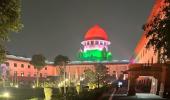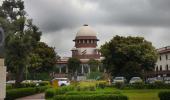A Governor does not possess any discretion in exercise of functions under Article 200 of the Constitution in respect to any bill presented to them and must mandatorily abide by the advice tendered by the council of ministers, the Supreme Court has held.

A bench of Justice J B Pardiwala and Justice R Mahadevan said the Governor could exercise discretion only in specific limited exceptions provided under the Constitution.
"Thus, we are of the view that the Governor does not possess any discretion in the exercise of his functions under Article 200 and has to mandatorily abide by the advice tendered to him by the council of ministers," it said.
The only exceptions to this rule can be traced to the second proviso to Article 200 and Article 163(1) of the Constitution, the bench said.
"Thus, only in instances where the governor is by or under the Constitution required to act in his discretion, would he be justified in exercising his powers under Article 200 contrary to the advice of the council of ministers. Further, any exercise of discretion by the Governor in exercise of his powers under Article 200 is amenable to judicial review," it said.
While construing the role of the Governor in the context of Article 200, the court must keep in mind that such a role has been envisaged not to supplant the opinion of the council of ministers but to infuse it with their wisdom, the top court bench said.
"The role of a friend, philosopher and guide which a Governor is to play under the Constitution is played by him at various stages of administrative and legislative functioning of the state. Article 167 makes it mandatory for the chief minister to share with the governor, inter alia, the proposals of legislations that the government wishes to introduce in the state legislature," it said.
It added that the advisory role of the governor was best played by engaging with the ministerial council even before the legislation's introduction in the legislature.
"He is well within his rights, and in fact, it is his bounden duty to put to use his experience and wisdom by making constructive suggestions to the Cabinet regarding the legislative proposals. The council of ministers would also do good to take into consideration the advice of the governor and deliberate upon it so that the legislation and ultimately, public interest is benefitted," it said.
Justice Pardiwala, in his 415-page verdict, said once the bill was passed by the state legislature and presented to the Governor for assent, they must act on the aid and advice of the ministerial council as a general rule and only in exceptional situations should they reserve it for the consideration of the president.
"The framers did not expect that the Governor would, as a matter of routine, declare the withholding of assent to bills casually. The deletion of the expression 'in his discretion' from the first proviso is also an unmistakable indication of the intent of the framers in vesting no discretion in the Governor as regards the withholding of assent and returning of the bill along with suggestions for the introduction of amendments," it said in the verdict pronounced on April 8.
It added that the deletion of the expression 'in his discretion' by the framers of the Constitution during the course of adapting Section 75 of the Government of India Act, 1935, into Article 200 was a clear indication of their intent to make the ordinary exercise of powers of the Governor under Article 200 subject to the aid and advice of the ministerial council.
On the discretionary powers, the bench said there were only two broad circumstances under which it would be permissible for the Governor to act in their own discretion under Article 200.
"Where the Governor is by or under the Constitution required to act in his discretion. The only situation in which such exercise of discretion has been explicitly laid down in the Constitution is the second proviso to Article 200, that is, where, in the opinion of the Governor, the bill, if assented to, would so derogate from the powers of the high court as to endanger the position which the high court is designed to fill by the Constitution," it said.
The second circumstance is where the Governor is, by necessary implication, required to act in their own discretion, it added.
"This would include: (i) Where a bill attracts such a provision of the Constitution which requires the mandatory assent of the president for securing immunity or making the law enforceable. Exercise of discretion is permissible in these cases. For instance, article(s) 31A, 31C, 254(2), 288(2), 360(4)(a)(ii) etc. (ii) Situations where the exceptional conditions are applicable ie, the state council of ministers has disabled or disentitled itself; possibility of complete breakdown of the rule of law or by reason of peril to democracy/democratic principles respectively, as a consequence of which an action may be compelled which, by its nature is not amenable to ministerial advice," it said.
The bench also declared a view taken in a 2019 verdict in the B K Pavitra case as 'per incuriam' to the extent of the following two observations made therein -- first, that the Constitution conferred discretion upon the Governor in so far as the reservation of bills for the consideration of the president was concerned and, secondly, that the exercise of discretion by the Governor under Article 200 was beyond judicial scrutiny.











 © 2025
© 2025